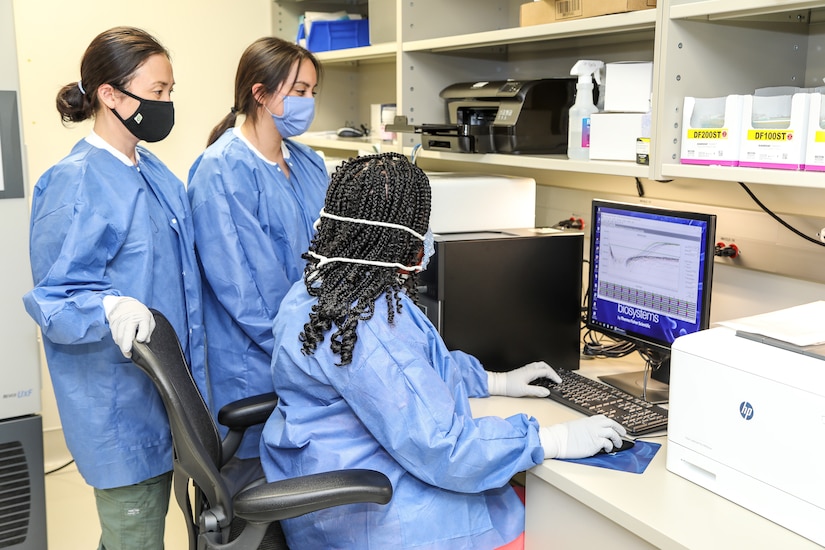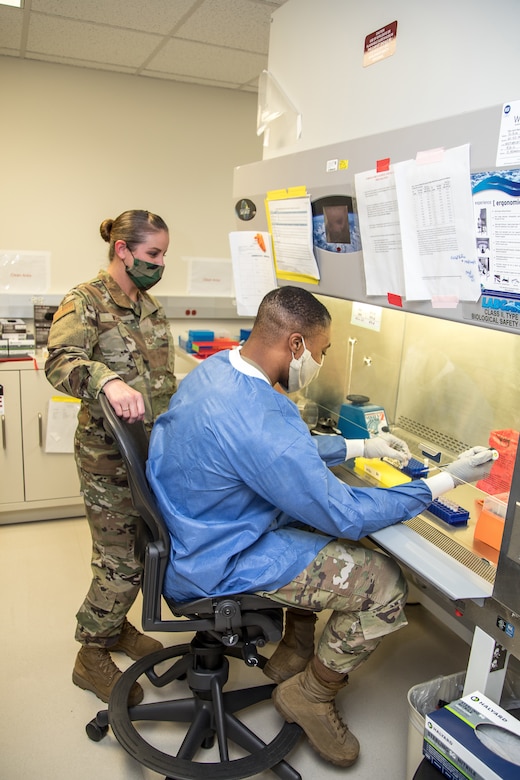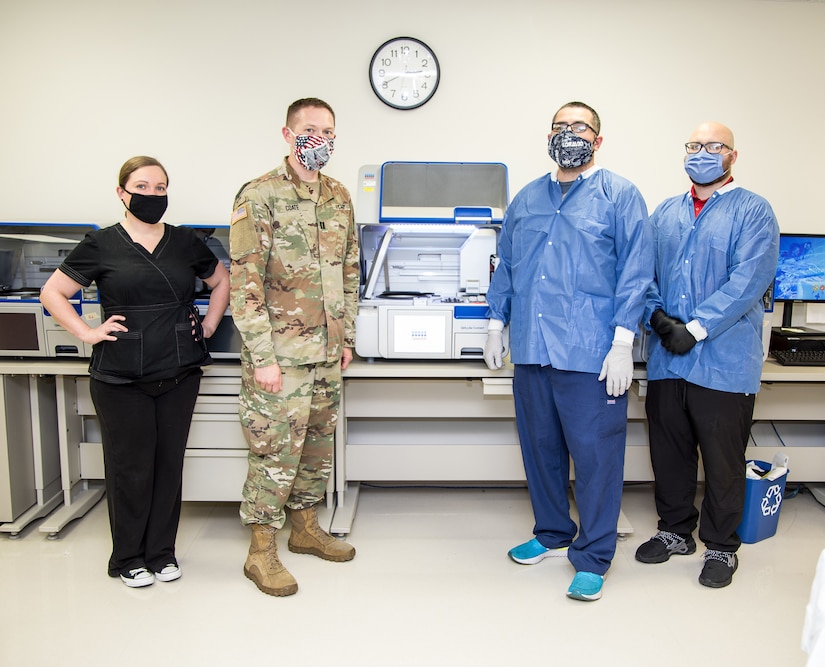Joint Base San Antonio-Fort Sam Houston is home to the busiest military hospital in the United States, Brooke Army Medical Center, where lab technicians have processed more than 10,000 COVID-19 tests.

As one can imagine with a hospital as large as BAMC, COVID-19 has spurred a change in normal operations in various areas. Nurses and doctors all over the world are doing a phenomenal job day in and day out, but the role of lab technicians can easily be overlooked
Though they may not be on the front line testing or caring for patients face to face, they have been working diligently in recent months, aiding the fight against the novel coronavirus.
"Since COVID started, we have added additional personnel to help with the large mission requirements that COVID has presented us," said Army Capt. Eric Coate, chief of Molecular Diagnostics and Immunology at BAMC.
Leslie Contreras, medical technologist, said routine tests have decreased in number, while COVID testing has become the main focus. "Some tests have been put on a hold and are being sent to a reference lab to accommodate the priority of COVID," Contreras added.
Coate said although the lab's hours are 5 a.m. to 10 p.m., the lab techs often run testing for 24 hours, when the number of samples collected necessitates around-the-clock operations. The workers wear the proper mandated personal protective equipment when working, which consists of a lab coat and gloves in their Biosafety Level 2 lab environment.
The section that tests for COVID-19 is led by Army Lt. Col. Robert Cybulski, Jr. and supervised by Marisa Fernandez. Cybulski recognizes the help the lab has received in their efforts to combat the virus. "Aside from our teammates within the Department of Pathology, we collaborate with the staff that is running the BAMC testing and screening operations, the staff of the Infectious Disease Service, and the staff of the Preventive Medicine Department," he said. "We have benefited from support provided by separate commands located on Fort Sam Houston [Public Health Laboratory] and retired Army officers who have been reactivated to support the COVID-19 response."

Along with these departments, the Wilford Hall Ambulatory Surgical Center and Food Analysis and Diagnostics Laboratory technicians have volunteered their time and resources to assist the ongoing COVID-19 mission at BAMC. All of this assistance has aided the lab in conducting so many COVID-19 tests while still maintaining focus on their regular mission.
So what happens when a test comes back positive?
"Immediately after a positive result is generated in the lab and reviewed at the appropriate level, the results are reported to senior leadership in the hospital," Cybulski said. "Immediately after that, they are passed to a group of infectious disease physicians for appropriate clinical follow up."
"On a daily basis, the total list of positives generated during that time period is sent to infectious disease, as well as the Public Health personnel on Fort Sam Houston and Lackland Air Force Base, and select physicians within BAMC Family Medicine, to ensure that patient follow-up is completed and documented appropriately, and to facilitate additional reporting on the Public Health side," he said.
This chain of events allows for safe and proper acknowledgement for those infected to seek treatment and be able to quarantine, along with an effective follow-up of patients.
Air Force Lt. Col. Carolann Miller, laboratory manager, said she believes that at the beginning of the pandemic, there was increased anxiety due to the fear of the unknown as this is a new virus. However, over time and with proper guidance like wearing face masks, social distancing and the adjustment of work schedules, the anxiety has somewhat subsided, she said, while stressing the importance of ongoing vigilance.

"The lab's biggest impact on COVID-19 is laboratory and molecular section leadership being 100% engaged from the beginning and getting the testing for this virus in-house as soon as possible to serve our beneficiary population in the [Joint Base San Antonio] area," Miller said.
Air Force Col. Samantha Butler-Garcia, chief of the Department of Pathology and Area Laboratory Services, revealed that her favorite part about coming to work is providing safe and high quality health care for active duty and veteran personnel. "They have made sacrifices for their country in ways that are often unimaginable, so they deserve the best health care," she said.
The laboratory has shown amazing resilience as it has adapted to the evolutionary changes that have come from the [Centers for Disease Control, and Prevention, the Defense Department and other agencies regarding the understanding of COVID-19, said Army Master Sgt. Jeffrey Thomas, noncommissioned officer in charge of the Department of Pathology and Area Laboratory Services. The staff has shown a level of teamwork and camaraderie that he has experienced only under the most high-stress environments, he added.
"Civilians and military members from other sections of our laboratory and exterior DOD organizations with laboratorians stepping forward to be a part of the testing teams to assist us is a thing of true professional harmony," Thomas said.
(Zaria Oates is assigned to Brooke Army Medical Center.)








No comments:
Post a Comment